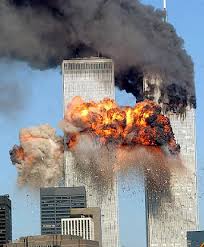In this Tuesday, Sept. 11, 2001 file photo, Chief of Staff Andy Card whispers into the ear of President George W. Bush to give him word of the plane crashes into the World Trade Center, during a visit to the Emma E. Booker Elementary School in Sarasota, Fla. (Credit: AP/Doug Mills)

Last year Jonathan Kay, a Canadian journalist, published “Among the Truthers,” an interesting chronicle of, among other things, post-9/11 conspiracy theories. Many of these theories are outlandish on their face, such as claims that the twin towers were brought down by controlled demolition, that airplanes never struck them, that Flight 93 landed in Cleveland rather than crashing in a Pennsylvania field, and so forth.
Now if I were inclined toward a conspiratorial view of the world, I would speculate that the very outlandishness of these claims is itself part of a conspiracy to obscure what really happened on 9/11. This meta-conspiracy theory would go something like this: Over the past 11 years, it has slowly but inexorably become clear that the CIA uncovered key details of the 9/11 plot several months in advance, and tried on numerous occasions to get the Bush administration to take action to stop it.
In a New York Times Op-Ed, Kurt Eichenwald offers new evidence on this front. Throughout the spring and summer of 2001, Eichenwald claims the CIA presented the administration with compelling evidence that al-Qaida operatives were in the United States, that they were planning a major terrorist attack intended to produce mass casualties, and that this attack was imminent. In response, the Bush administration did nothing.
Indeed, the administration’s level of inaction was so negligent that senior intelligence officials actually considered resigning, so as not to be in a position of responsibility when the attack took place:
Officials at the Counterterrorism Center of the C.I.A. grew apoplectic. On July 9, at a meeting of the counterterrorism group, one official suggested that the staff put in for a transfer so that somebody else would be responsible when the attack took place, two people who were there told me in interviews. The suggestion was batted down, they said, because there would be no time to train anyone else.
For a long time, the administration successfully covered up this series of events, by employing the clever strategy of revealing a small and ultimately misleading part of the truth: In April 2004, it declassified a single daily briefing, that featured the startling headline “Bin Laden Determined to Strike in U.S.,” but on closer examination did not contain much in the way of specifics regarding the attack, which took place just 35 days after the memo’s printing.



No comments:
Post a Comment